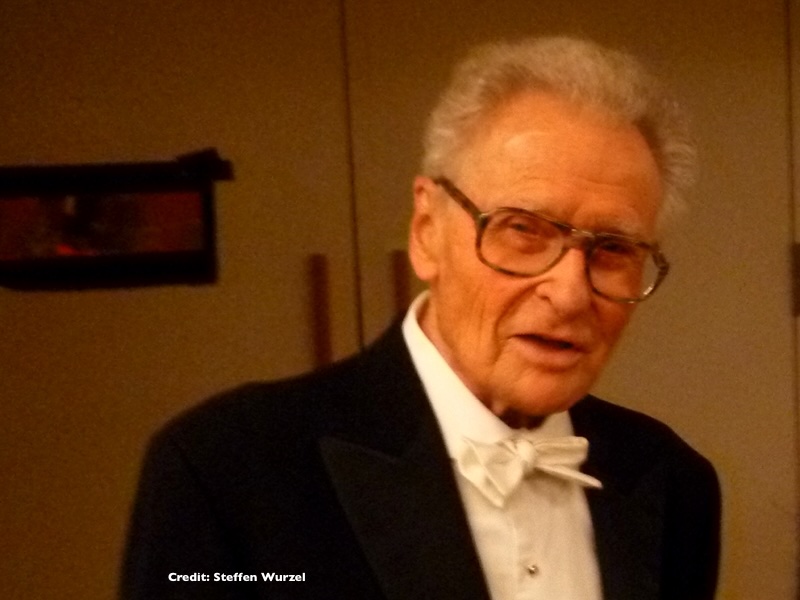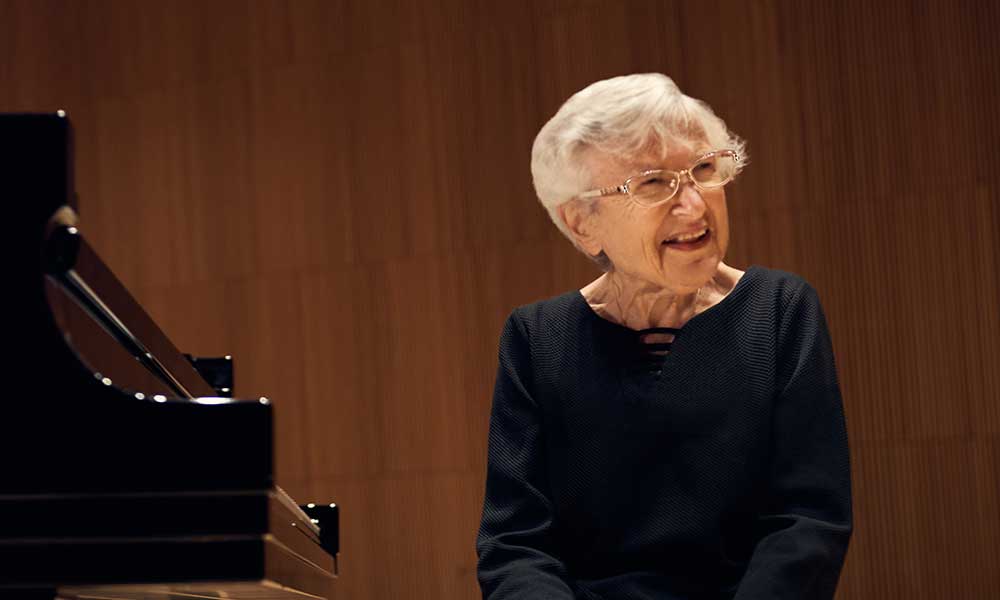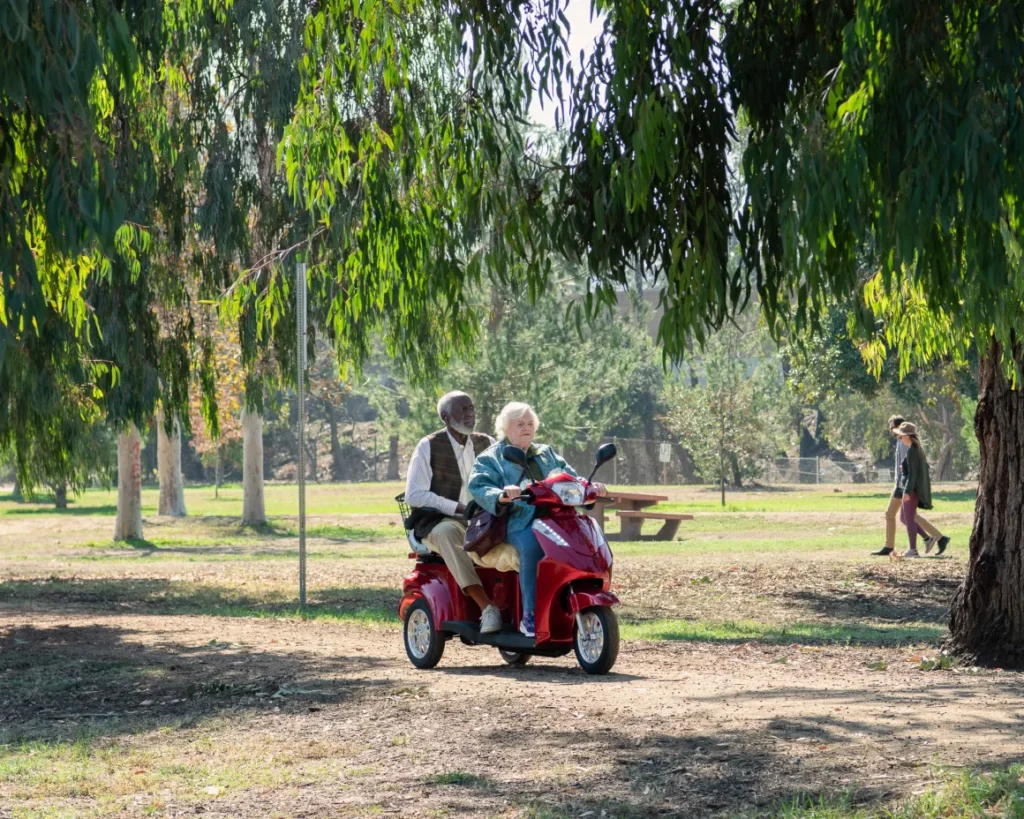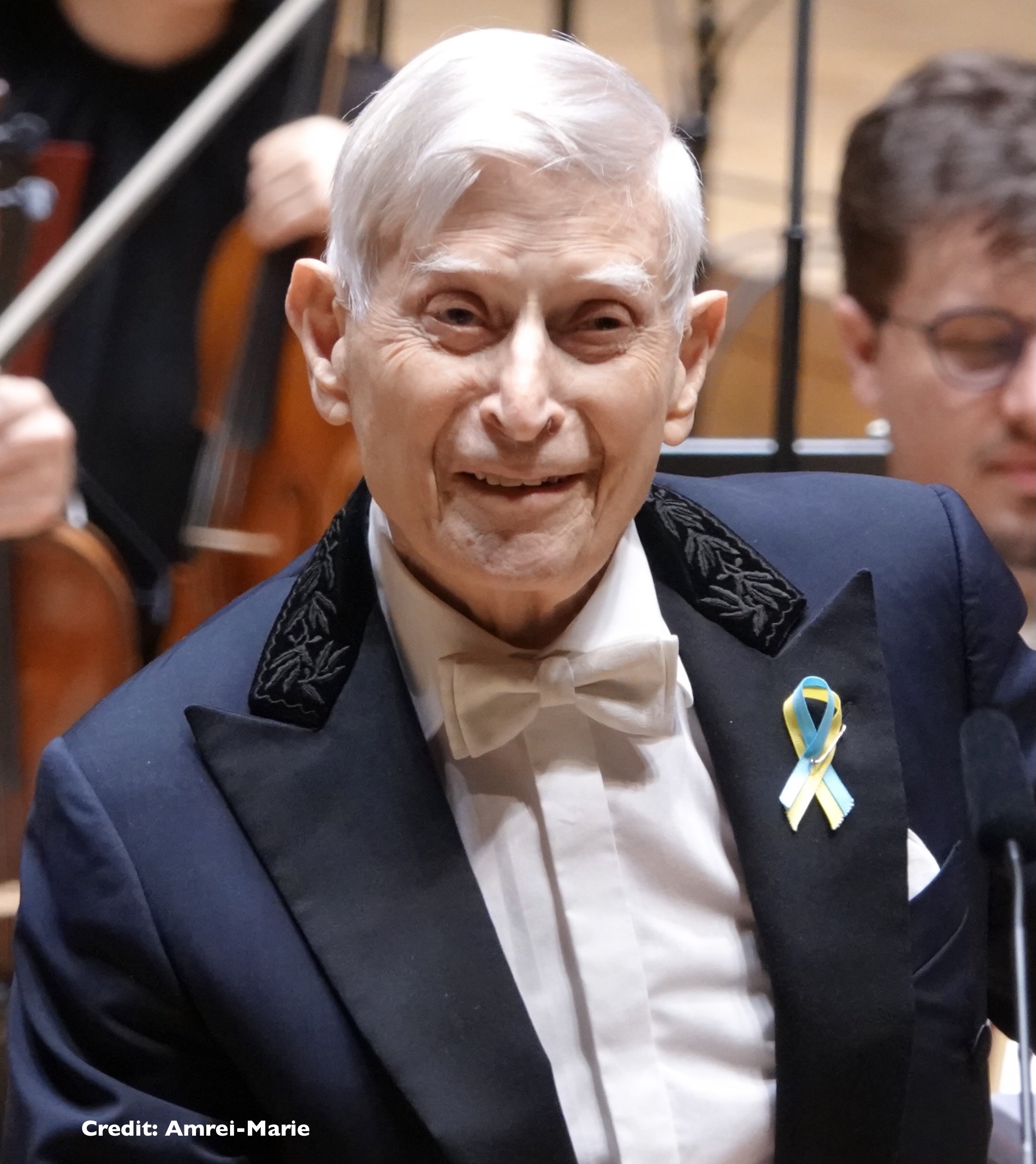Have you ever wondered why so many conductors and pianists continue to perform well into their 80s and 90s? The Swedish-American conductor Herbert Blomstedt (photo at right) is 98, but you wouldn’t know it by his concert schedule. The number of performances on his calendar over the next few months would be the envy of many younger conductors. His last full-time position as director of an orchestra was with the San Francisco Symphony (1985 – 1995), but he has been in constant demand as a guest conductor ever since.
Conventional wisdom has often attributed conductors’ longevity to the cardiovascular exercise they get while practicing and performing, but is that really the reason? Recent research suggests their longevity may have more to do with the brain.
As I write this, Blomstedt is scheduled to conduct the Oslo Philharmonic and Leipzig Gewandhaus Orchestra in September of this year, the NHK Symphony Orchestra Tokyo in October, the Royal Stockholm Philharmonic Orchestra and the NDR Elbphilharmonie Orchestra in November, the Bamberg Symphony in December, the Boston Symphony Orchestra in March 2026, the Berlin Philharmonic in April, the San Francisco Symphony, the Detroit Symphony, and the Swedish Radio Symphony Orchestra in May, and the Bamberg Symphony in July – this concert in honor of Blomstedt’s 99th birthday!
Several of these concerts include the Mahler 9th Symphony, which clocks in at nearly an hour and a half. At a November 2024 performance with the London Philharmonia, Blomstedt conducted Mahler 9 after conducting the Mozart 4th Violin Concerto (runs about 25 minutes) with violinist Leonidas Kavakos. That would be a significant feat even for a much younger conductor.
Blomstedt is known and admired by musicians for the respect and admiration he shows for members of the orchestras he conducts, for his insightful interpretations, for his commitment to every performance as if he were conducting the music for the first time, and for what Alex Ross refers to as his “preternatural rightness: no gesture feels out of place, no gesture feels routine.”
Blomstedt has said: “Retirement is not a question of age, it should be flexible. I just love the music so much that I just can’t give up. There are always things that I want to learn. I’m never satisfied. I’m happy for the results we get now and then, but I’m not really satisfied. Satisfaction lies in the hope of even better possibilities in the future, and I want to take all those chances.”

Blomstedt isn’t the only conductor to perform well into his elder years. Leopold Stokowski (1882-1977) conducted into his 90s, as did Stanisław Skrowaczewski (seen in photo at left). Roger Norrington conducted until the age of 87, Zubin Mehta is still conducting at the age of 89, and Christoph von Dohnányi conducted his final concert with a professional orchestra at the age of 93, although he still occasionally worked with student orchestras until his recent death at the age of 95.

There have been many pianists who performed into their 80s and 90s as well. Ruth Slenczynska (photo at right) celebrated her 97th birthday in 2022 by playing a concert of music that was all new to her. Mieczysław Horszowski played his last recital at the age of 99, slightly more than a year before his death in 1993. Earl Wild played his last performance at the age of 92. And then there was cellist Pablo Casals, who was said to have played Bach Cello Suites every day of his life until he died at the age of 96.
Might all these musicians who are/were so active in their 80s and 90s indicate that music making may be a fountain of youth?

Many people, especially today, live well into their 80s and 90s, but not many continue their professional lives that late in life, although the actor June Squibb has recently been in the news. After a several-decade career in supporting roles, Squibb starred in her first leading role in Thelma at the age of 93 (released in 2024), followed by Eleanor the Great, filmed at the age of 94 (released in 2025). During the filming of Thelma, Squibb insisted on doing many of the stunts herself, including riding the scooter.
Cardiovascular exercise (mentioned at the top of this article) may play some small role in a conductor’s or pianist’s longevity. And certainly the genetic makeup of any particular musician plays a significant role in how long they are able to continue performing. But research is looking at something else to explain how and why people age well, and that has to do with our brains and something called cognitive reserve.
Normal aging is associated with progressive cognitive decline, unfortunately beginning in early adulthood. Some of the cognitive functions that decline with age are 1) executive functions, 2) processing speed, 3) the ability to hear speech in noise, and 4) visuospatial abilities.
Executive functions (working memory, inhibitory control, and cognitive flexibility) are often compared to the conductor of an orchestra (rather appropriately for this post). Just as a conductor interprets a score, sets a tempo, and communicates his musical intentions to the orchestra, executive functions are a set of mental skills that help us set goals, plan and organize, and follow through to complete those goals.
Processing speed has to do with how quickly the brain takes in, interprets, and responds to information. Hearing speech in noise does not actually mean how well we hear, but refers to the quality of the brain’s speech processing. And visuospatial abilities refers to understanding spatial relationships, navigation, and conception of distances, areas, and volumes. In future posts, we’re going to talk in more detail about all of these cognitive abilities and how we strengthen them when studying and making music.
Interestingly, several studies that have compared older musicians to non-musicians show that musicians are stronger in all of these areas of cognition than are non-musicians. They have stronger executive functioning ability, faster processing speed, are better at hearing speech in noise, have better visuospatial abilities and THEREFORE, they have a lower risk of dementia.
That is not to say that musicians do not suffer from dementia. We probably all know a musician or know of a musician who has suffered from dementia. But in general, they have more cognitive reserve protecting against it.
So what is cognitive reserve? In the 1980s, researchers discovered that there were individuals who had shown no signs of cognitive decline or dementia, who nevertheless in postmortems showed brain changes that were consistent with advanced Alzheimer’s. The brains of these individuals weighed more and had a greater number of neurons than people of a similar age. They had a greater “reserve.” They had probably lost neurons due to cognitive decline as everyone does, but they had a reserve and could still function well. That came to be known as cognitive reserve.
Harvard Health refers to cognitive reserve as “the brain’s ability to improvise and find alternate ways of getting a job done.” Musicians can certainly relate to that. Studies have shown that the more cognitive reserve you have, the more you are able to cope or compensate for neurological decline or damage in your brain. Just as exercising builds muscle mass and helps you to keep your body in good physical shape thus recovering faster from injuries, building up cognitive reserve helps to keep your brain in shape to compensate for neurological damage.
How does one develop greater cognitive reserve? More education, being bilingual, and having a cognitively complex occupation have all been shown to contribute to cognitive reserve. Having more education might mean more years of formal education, but could also mean being a voracious reader, giving yourself continual learning challenges, traveling to interesting locations – or years of musical study, all of which induce the brain to develop stronger, more efficient neural networks.
Shifting between two languages, as you do if you are bilingual, also strengthens neural connections in the brain, especially in the areas associated with executive functions. And what exactly is a “cognitively complex occupation?” By that term, researchers mean an occupation that requires a high level of intellectual engagement, problem solving, decision making, application of complex knowledge and skills, and complexity of work with people.

Neuroscientists say that making music is the most complex activity in which a human can engage, and they consistently point to making music as a good way to build cognitive reserve.
So over the next few posts, we are going to look a bit more at cognitive reserve, at how children develop it when they study music, at how musicians build it through a lifetime of making music, and as shown in a new study, how even adults in their 60s and 70s who have never studied music previously, can build cognitive reserve in just a year of taking piano lessons!
Making music may well be a fountain of youth!
More to follow!





5 responses to “Might making music be a “fountain of youth?””
This article was very interesting. Do those who love music and read nonstop and continually challenge themselves in art skills have equal opportunity to keep their cognitive skills? Adrienne
Thanks, Adrienne. There is a significant amount of research about the brain and the benefits of being involved in the arts. I have focused on music and the brain, but the next time I see a study pertaining to the visual arts, I will send it to you. There are also a couple of books that you may find of interest. I will send you the titles of those as well. All of the arts are good for the brain!!
I love this article. I studied with Ruth Slenczynska for 20. She is so amazing. I’m 75 and still play at my church and accompany choirs and soloists. I never want to retire. Thanks for this wonderful blog. I ordered and received your book today
Thanks, Billie. I have never met Slenczynska, but she seems to be an amazing woman.
Hello Lois. Ruth Slenczynska is amazing, indeed. She had her 100th bday last January, and she is living in a retirement home in California, in assisted living. Thank you so much for including this wonderful woman in your blog.